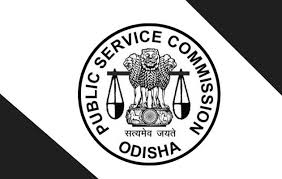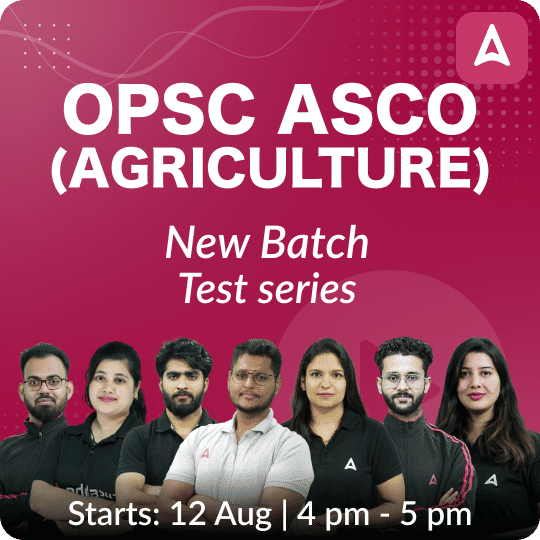OPSC Assistant Soil Conservation Officer (Agriculture) Complete Batch with All New Complete Test series | Online Live Classes by Adda 247
Starts: 12-Aug-2024
Seats: 1000
Timings: 04:00 PM - 05:00 PM

- Get Access To The Top Faculties Of India
 Experienced Faculties
Experienced Faculties - Access To Career Counseling, Printable Pdf & Notes
 Counseling, Pdf & Notes
Counseling, Pdf & Notes - Live Classes And Their Recordings Post Class
 Live & Recorded Classes
Live & Recorded Classes - Get Your Doubts Solved From Subject Matter Experts
 Doubt Solving Facility
Doubt Solving Facility
- Access to Structured Classes in Live & Recorded Form
- Interactive classes, handouts and class notes
- Doubt Solving on app, Telegram Groups & in person at offline centers
- Seminar & Topper Talks at Offline Centers
- In-Person Counseling, Physical Support Helpdesk at Offline Centers
- Planner, Previous Year Papers & Preparation Tips on emails regularly
 OPSC
OPSC
This Course Includes
150 Hrs Online Live Classes
28 Mock Tests
7 E-Books
Faculty Profile
- 2+ years of Experience
- More than 15000 Aspirants Mentored
- More than 200 Selections

- 4+ years of Experience
- More than 50000 Aspirants Mentored
- More than 500 Selections
- 3+ years of Experience
- More than 30000 Aspirants Mentored
- Subject Matter Expert

- 6+ years of Experience
- More than 80000 Aspirants Mentored
- Qualified ICAR-AIEEA (UG), ICAR-AIEEA (PG) & PhD Entrance Exam
- 4+ years of Experience
- More than 50000 Aspirants Mentored
- More than 600 Selections

- 2+ years of Experience
- More than 20000 Aspirants Mentored
- University Gold Medalist
Overview
OPSC Assistant Soil Conservation Officer (Agriculture) Complete batch is designed for all those aspirants who want to improve their Professional Knowledge i.e. Agriculture and are unable to score better marks in this section.
Its contents will clear the basic concepts of All Agriculture Subjects, helping students of any standard or background to understand any question in a better way, thereby helping in score more.
This Complete batch will help you understand, learn & practice all the important concepts and topics needed to ace the OPSC ASCO Exam. Our expert faculties have curated the syllabus thoughtfully by keeping in mind the timeframe given to prepare & ensure selection in OPSC ASCO Exam.
OPSC ASCO Recruitment 2024- Overview | |
Conducting Body | OPSC |
Post | Assistant Soil Conservation Office (ASCO) |
Exam Level | Odisha State level Exam |
Selection Process | Written & Interview |
Notification Date | 06 JULY 2024 |
Date of Exam | N/A |
This Package Includes
- 150+ Hours Interactive Live Classes
- All New Complete Test series of Prelims & Mains
- Syllabus is based on the New Exam Pattern
- Special App Community For this Batch
- Enroll in this Batch, Limited Seats available
- Recorded Videos available 24/7 for Quick Revision
- Solve Unlimited doubts with experts
- Get Preparation tips from the experts & Learn Time Management
- Doubt Room Facility
- Sessions PDF
Study Plan
Check the study plan here.
Subjects Covered
Paper 1
- Unit 1: General agriculture: Importance, Trend in agriculture and allied sectors, Present day problems and remedial measures, Government policies.
- Unit 2:Natural Resources: Land Water, Forest, Energy - their use, exploitation, conservation, equitable use of resources for sustainable lifestyle: Plant Ecosystem: Biodiversity and its conservation: Environmental Pollution: Natural Disasters and their management: Organic farming and Sustainable agriculture: Conservation agriculture: Agricultural waste management: Climate change and agriculture.
- Unit 3: Soil farming processes; Soil physical properties: tenure structure, density and porosity; Soil water retention, movement and availability; Soil reaction-pH, Soil acidity and alkalinity; Soil organic matter: influence on soil properties and soil fertility; Soil organisms: macro and micro organisms, their beneficial and harmful effects; Soil pollution: behavior of pesticides and inorganic contaminants, prevention and mitigation; Soil quality and health.
- Unit 4: Weather and crop growth; Tillage and tilth; Modern concepts of Tillage; Seed and sowing; Cropping systems and Integrated Farming System; Crop nutrition: Essential nutrients - their functions and deficiency symptoms in plants; Nutrient sources: organic manures-fertilizers- biofertilizers-Integrated Nutrient Management; Water and weed management in field; horticultural and plantation crops; Plant protection; Harvesting, storage and value addition.
- Unit 5: Economic importance: production and protection technology of important field crops rice, maize, finger millet, pulses and oilseeds, cotton, sugarcane, potato, Importance and scope of fruit and plantation crops production and protection technologies for the cultivation of fruit and plantation crops-mango, banana, citrus, guava, litchi, papaya, pineapple, pomegranate, jackfruit, coconut, areca nut, cashew, tea, coffee, rubber: Nursery techniques and their management: Nutrition garden
Paper 2
- Unit 1: Agre forestry-objectives and potential; Agroforestry system-subsystem and practice; Planning for agro forestry-constraints, diagnosis and design methodology, selection of tree crop species for agroforestry; Agroforestry for food, feed, fuel and nutritional security, soil improvement-carbon sequestration, microclimate amelioration, industrial requirement
- Unit 2: Rainfed agriculture: problems and prospects; Rainfall analysis: Draught-classification, causes and impacts, drought management strategy, crops and cropping systems, soil moisture and rain water conservation-in-situ and Ex-situ storage, water harvesting and recycling, contingent crop planning under aberrant weather conditions, dry land horticulture: Watershed planning based on land capability classes and hydrologic data, watershed delineation and prioritization: Water budgeting in a watershed: Integrated watershed management-concept, objectives components, arable lands agriculture and horticulture, non- arable lands-forestry, fishery and animal husbandry; Watershed programme-execution, follow-up practices, maintenance, monitoring and evaluation; Participatory watershed management role of watershed associations, user groups and self-help groups and formulation of project proposal for watershed management programme including cost-benefit analysis.
- Unit 3:Soil and water conservation issues and importance: causes and agents of soil erosion: water erosion Hydrologic cycle, precipitation and its forms, Runoff estimation, Forms of water erosion, Gully classification and control measures, Principles of erosion control: Introduction to contouring, strip cropping, contour bund, graded bund and bench terracing, grassed waterways and their design: Water harvesting principles, importance and techniques: Runoff harvesting-short-term and long-term techniques: Water harvesting structures farm ponds-percolation pond-dug-out and embankment reservoir types, tanks and subsurface dykes: Wind erosion: mechanics of wind erosion. Types of soil movement Principles of wind erosion control and its control measures
- Unit 4: Wasteland-causes, distribution and sustainable wasteland development- Government policies, Participatory approach; Afforestation, shifting cultivation, Optimal land use options: Reclamation of Saline, Sodic, Acid, Waterlogged, Eroded, Compacted, Flooded, Polluted soils and Mie spoils: Desertification-impact and causes, prevention and control measures; Bio-remediation of soils through multipurpose tree species
- Unit 5:Protected cultivation; importance and scope controlled conditions, method and techniques, canopy management, irrigation and fustigation, liquid fertilizers ad their solubility and compatibility, insect pest and disease management: Production of quality planting materials, cultivation of high value crops and off-season production in green houses; Components of precision faring: Remote sensing Geographical information system (GIS) Differential Geo-positioning System(DGPS), Variable Rate applicator(VRA), application of precision faring in agriculture; Remote sensing and GIS in diagnosis and management of problem soils: Land capability and land suitability classification
Exam Pattern
OPSC conducts the OPSC ASCO 2024 Exam in 2 stages. First, is the OPSC ASCO Written Exam and then there is an Interview round. The maximum marks for both stages are provided below:
- There shall be a negative marking of 0.25 marks.
- The written exam consists of two papers. Both papers are of 100 marks each.
- The duration for each paper is 2 hours.
- All the questions are of objective type
| OPSC ASCO Recruitment Exam Pattern | ||
| Stage | Exam Type | Marks |
1 | Written Exam | 200 |
2 | Interview | 25 |
| Stage 1: OPSC ASCO Written Exam Pattern | |||
| Sl. No. | Paper Name | Marks | Time (in Hours) |
1 | Paper 1 | 100 | 2 |
2 | Paper 2 | 100 | 2 |
| Total | 200 | 2 | |
Eligibility
| Qualification | Other Eligibility | Age |
| B.Sc Agriculture, Horticulture, Forestry, Agriculture Engineering from any recognized University with an aggregate of 50% marks, 45% marks in case of SC/ST/PwBD candidates. | The Candidate must be able to Read, Write and speak Odia. | Minimum: 21 Years Maximum: 38 Years 5 yrs age relaxation for SC, ST Person with Disability belongs to SC, ST Categories Eligible for 15 yrs Age Relaxation. Ex-service man and Women 10 yrs Age Relaxation. |





 150 Hrs
150 Hrs 28
28 7
7
